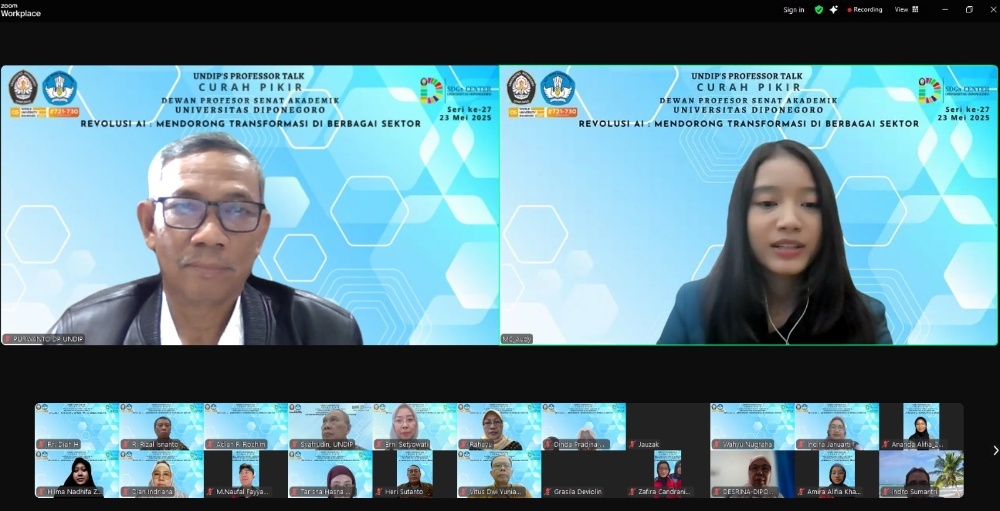UNDIP, Semarang (May 25, 2025) — The Board of Professors of the Academic Senate of Universitas Diponegoro reaffirmed its commitment to advancing national academic discourse by hosting the 27th edition of its “UNDIP’s Professor Talk” webinar on Friday, May 23, 2025.
Professors and academics from various disciplines shared critical and reflective insights on the overarching theme, “The AI Revolution: Driving Transformation Across Sectors.” The webinar was held via a Zoom meeting and live-streamed on UNDIP TV’s YouTube channel, attracting 159 participants, including faculty, students, researchers, and members of the general public.
Prof. Dr. Ir. Purwanto, DEA, Chair of the UNDIP Board of Professors, opened the event by emphasizing that artificial intelligence is not just a tech trend but a call for national readiness to adapt to fundamental changes in how we live, work, and think. “Artificial Intelligence is not merely a tool. It is a transformative force that compels us—especially within academia—to remain adaptive, innovative, and collaborative,” said Prof. Purwanto.
He underscored the central role universities must play in shaping an AI ecosystem that is ethical, human-centered, accountable, and sustainable. According to him, academics must not only be users of AI but also solution creators rooted in research, humanity, and a long-term vision.
“AI should not replace humans but rather become a partner in harmonious collaboration. This phenomenon is the essence of Industry 5.0—technology that is human-centered, resilient, and sustainable,” he added.
The webinar featured three speakers from diverse yet interrelated academic backgrounds, united by a shared spirit of digital transformation.
Prof. Dr. Ir. Riri Fitri Sari, M.M., M.Sc., a professor at the Universitas Indonesia’s Faculty of Engineering, opened the session with a presentation on “Smart Industrial Revolution: AI and Machine Learning at the Core of Global Production.”
Prof. Riri highlighted AI and machine learning (ML) as the new brains of the industry, driving automation, energy efficiency, and precision decision-making.
“Machines can now learn and adapt. But in the era of Industry 5.0, it is just as important to uphold human values, diversity, and sustainability,” she explained.
She also cautioned against the ethical pitfalls of transformation, including data bias, privacy violations, and job displacement. “We need ethical policies and multi-stakeholder collaboration to ensure AI use remains human-centered and socially just,” she said.
In the second session, Prof. Dr. Ir. R. Rizal Isnanto, S.T., M.M., M.T., IPU, ASEAN Eng., a professor from UNDIP’s Faculty of Engineering, discussed how AI presents both opportunities and challenges in the field of education.
He emphasized that AI is not meant to replace teachers but to enhance the learning process. “AI is a tool. The heart of education remains human. Machines cannot replicate a teacher’s empathy,” he noted.
Prof. Rizal described how technologies such as e-learning, virtual and augmented reality, big data analytics, and generative AI (such as ChatGPT, DALL·E, and Copilot) are opening new paths in education. These tools can generate text, audio, image, and video content that supports adaptive learning and innovative teaching materials. However, he also warned of ethical risks and misinformation.
He stressed the importance of digital literacy and ethical awareness in AI usage to prevent it from becoming counterproductive. “The key to advancing education in the age of AI lies in harmonizing human values, technology, and supportive regulation,” he said.
The final session was delivered by Prof. Dr. Indira Januarti, S.E., M.Si., of UNDIP’s Faculty of Economics and Business, who presented on “Digital Transformation in Accounting: The Critical Role of AI.” She explained how AI is revolutionizing accounting, from record-keeping to auditing, enabling real-time, more accurate data analysis.
Nevertheless, Prof. Indira also noted challenges such as data privacy, human resource readiness, and outdated regulations. Digital transformation is not without risks, but it is a call to continue learning and adapting. “AI makes accountants more strategic, not merely technical. But we must also anticipate threats like data breaches and ensure our professionals and policies are prepared,” she said.
She argued that adapting to AI is no longer optional in the accounting field—it’s a necessity to remain competitive and relevant. “Accountants must now serve as strategic business partners, not just bookkeepers. AI empowers us to make sharper, faster decisions,” she added.
The webinar was moderated by Prof. Dr. Rahayu, S.H., M.Hum., a professor at UNDIP’s Faculty of Law, who guided the discussion warmly and engagingly. The active participation of attendees reflected growing interest in the implications of AI across academic, economic, and social domains.
This edition of “UNDIP’s Professor Talk” did more than present academic perspectives—it served as a reminder that behind the power of AI, human values must always remain the guiding compass.
Through its professors, UNDIP continues to demonstrate that a university is not only a place for learning but also a home for visionary ideas shaping a more ethical, inclusive, and civilized technological future. (Public Communication/UNDIP/DHW)
